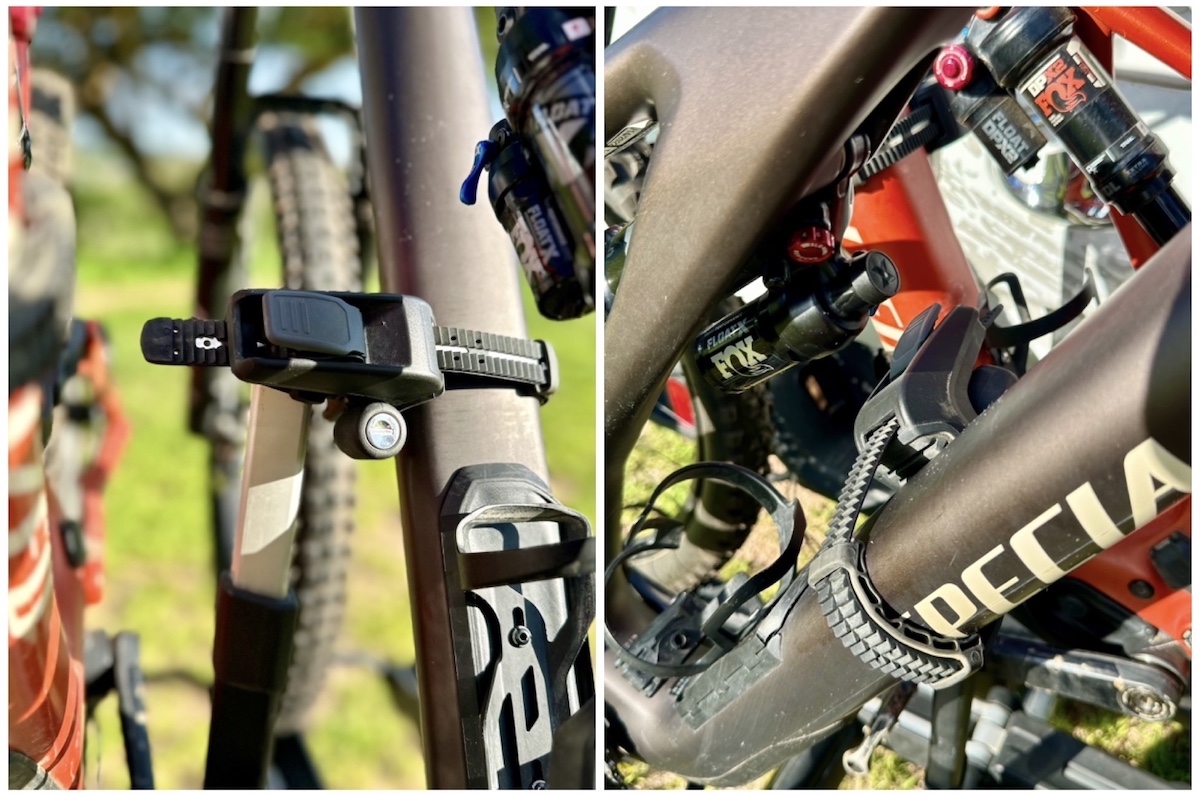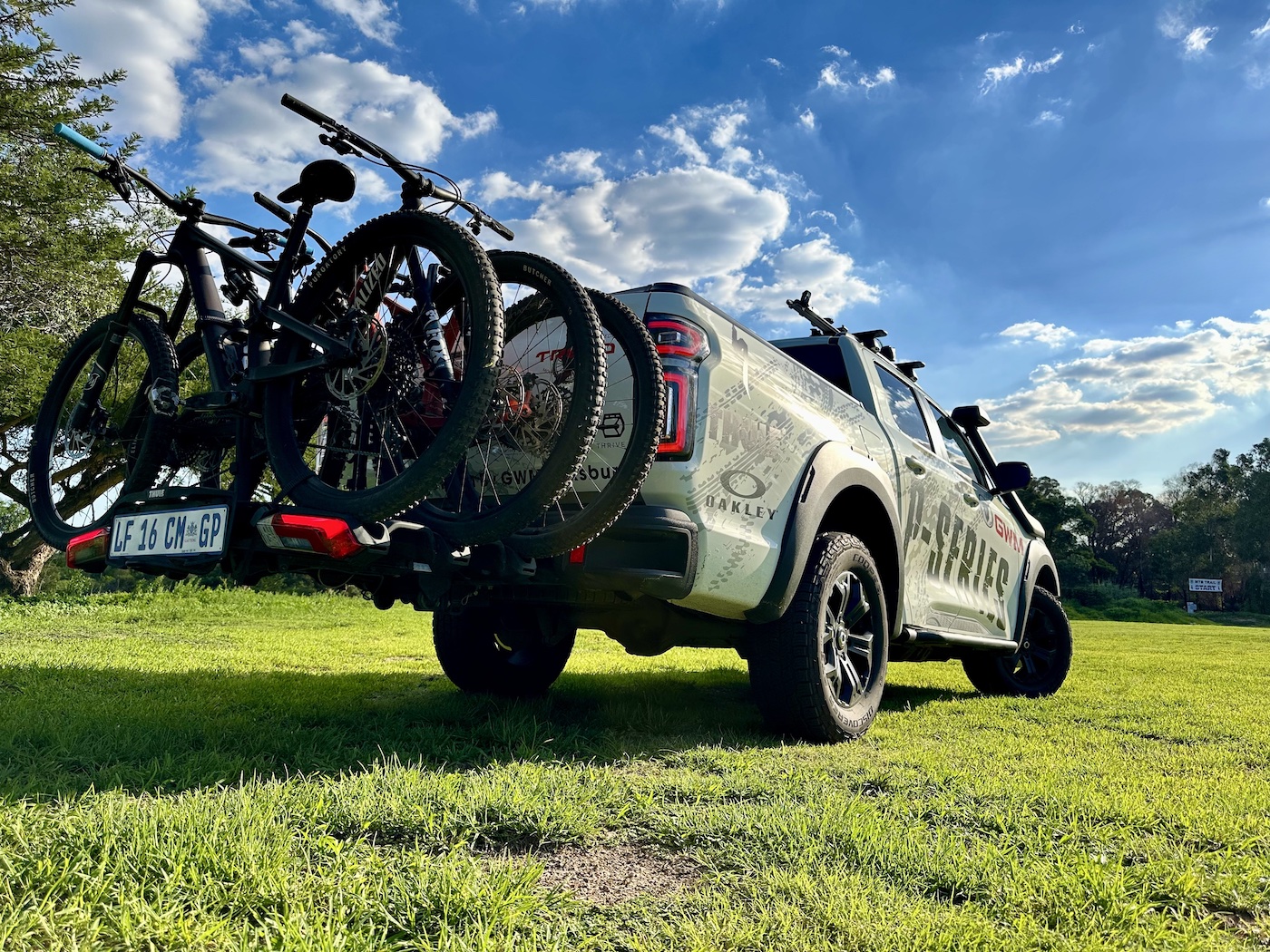There’s no doubt that Thule is the global leader in bike racks. With more than 65% market share, the Swedish brand is also the clear favourite among South African mountain bikers. And the recent launch of the new Epos confirms that Thule remains the category innovator. We have been testing the Epos with burly full-suspension mountain bikes over the past few months. Here’s what we think.

Just when you think that tow-bar mount bike racks have reached a peak in terms of design, Thule rethinks how best to attach bikes securely behind your car – and succeeds! The Epos is the result and it’s hard to fault much about the new model.
The main difference over its existing range of tow-bar mount racks is how the bikes attach to the rack. Instead of removable arms with frame clamps as has been the Thule design for many years, the Epos has been designed with independent arms for each bike. These arms are attached to the rack itself, are movable, extendable and can swivel with long, steel-reinforced straps on the end of the arms, secured with a lockable plastic ratchet.

This allows you to secure any part of a bike frame or even a wheel. No diameter is too large. The wheel wells are generous and can hold tyres up to 3.0 inches wide and the rack can accommodate bikes with a wheelbase of up to 1350mm, which means even long eBikes or trail bikes can be fitted with ease.

It comes in a two or a three-bike option. We mostly carry three bikes, so have been using the three-bike model. It’s surprisingly portable in that it folds onto itself from either side. So it’s easy to store or even put in your boot. It has wheels and handles to be able to wheel it along because it weighs just over 20kg.

There is 25cm of space between each bike. This is enough to ensure there’s no contact between bikes, which for us has always been our greatest challenge. No more puzzling over which bike needs to move slightly forward or back; no making compromises by loosening handlebars and twisting them; no more reluctantly supporting the pool-noodle market, no more having to snap photos to remind us how we got the bikes to fit before; no waking up 20 minutes early to allow for bike loading; no sweating in the midday sun/soaking in the pouring rain to rework the bike positions; and no grazing skin on your hands/knuckles…
Truthfully, this alone is worth the additional cost of the Epos over previous racks we have used. In the past, before the Epos, we have regularly found ourselves envying the simplicity of a trail-runner’s home departure. But with the Epos, no more…

Having said that, all the bikes we mostly transport have dropper seatposts, which makes the loading really easy. The Epos also works well with bikes that don’t have dropper seatposts, but this requires a bit of planning as to bike (fore/aft) positions, especially when carrying three bikes.

The design of the Epos also allows you to load or unload any of the bikes without having to remove other bikes on the rack. And the load capacity is 30kg per bike, which is more than enough for even the burliest of eBikes. A smart foot pedal allows you to tilt the rack to access the car’s boot. This is even possible with three bikes loaded.
The Epos includes all the relevant rear lights and number-plate mount to ensure you meet the legal requirements of a bike rack.

Each of the clamp-straps has its own lock. And the rack itself can be locked onto the towbar. Since we live in South Africa, where theft is prevalent, it’s worth investing in the Abus-developed lock for additional securing. This has been designed by the German lock manufacturer in collaboration with Thule to ensure the bikes can be locked by a second system to the rack.
Another accessory that’s pretty smart is the Bike Repair stand, which you secure to an empty, tilted rack, but which is a bike stand that you can use to do repairs when on the road. We tried it. It’s not the workshop level bike stand you are used to, but it does the job. Like the Abus lock, it’s not included in the box, so requires additional purchase. The Bike Repair stand costs R1899 and the Abus lock costs R2299.

It seems as if everything we have mentioned here is positive. That’s because it is. There’s actually nothing we can fault on the Thule Epos. It is a truly impressive bike carrier that sets the standard very high for tow-bar mount racks. Of course the price is sure to be seen as negative by some. A bike rack that costs more than R30 000 is always going to cop some flack. As with anything in the cycling game, if it’s too expensive for you, it may just not be for you.
Having enjoyed the functionality of this bike carrier for the past couple of months, we can say that if a no-hassle rack that’s high quality and very reliable is what you are after – and budget isn’t a concern – then the Thule Epos is for you.
Price: R31 999 (3 Bike) | R28 999 (2Bike)
More info here.



